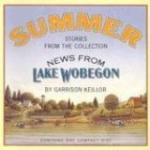“I recollect that one night father went out to drive away a porcupine whose teeth and claws he heard busily at work upon a barrel hoop, but the creature rushed into the house through the open door, and ran across the trundle bed where sister Arminda and I slept. I need not tell you how dangerous it would have been had one of his quills penetrated our flesh.”
“Do go on, auntie; this is delightful,” said Gabrielle.
“When father had paid for his land,” said mamma, “and bought a yoke of oxen and a cow—two essential things for a farmer—he had very little, if any, money left. There was no danger, however, that we should suffer from want, for the woods were so full of game that father would take his gun in the morning and go out to shoot something for dinner with the same confidence that he would have gone to a market to buy it. Partridges and pigeons in the greatest abundance formed our daily fare, while the deer used to walk into our corn-patch and almost offer themselves as targets for father’s or brother Barnes’ gun. Venison, I recollect, was so plentiful that a farmer, after shooting a deer, would only trouble himself to fetch home the hind-quarters and hide—the latter being marketable. In the spring there were cowslips and other wood plants in abundance, which made a delicious substitute for spinach. Tea was very scarce with us, and was kept for Sundays; but beech nuts, burnt and ground, made a very palatable coffee, that formed our daily beverage. Butter must have been an unmarketable article, for I remember that during the first three years we spent there, it sold for six cents a pound.”
“Did you grow anything on the farm to sell, mamma?” I inquired. “I suppose not, during the first years.”
“’No,” said mamma; “and if we had, there would have been no market for it.”
“Then what did you do for money, Aunt Esther?” said Ida. “Grandpapa had very little, you say.”
“I must not forget,” said mamma, “that we had one marketable production, and one that you would not easily guess.
“I wonder, Gabrielle, if your favorite chemistry goes back so far into elementary principles, as to tell you from what black salts are made? School-books seldom, I think, trouble themselves with the origin of things, so I will tell you that after the great logs were burnt that father had felled in clearing, the ashes were collected and leeched, and the lye boiled down in immense cauldrons till it became granulated like sugar. It then formed what was called ‘black salts,’ and these salts are the basis of potash, soda, etc. The salts could always find a ready market, and with them we paid our taxes, and bought what necessaries we could not raise ourselves.”
[1] Page 62.
CHAPTER XVI.
A Birthday—A Surprise—The Day celebrated by a Dinner—An Awkward Mistake—A Queen of Fashion—A Drive to Tarrytown—A Poem to Ida.




